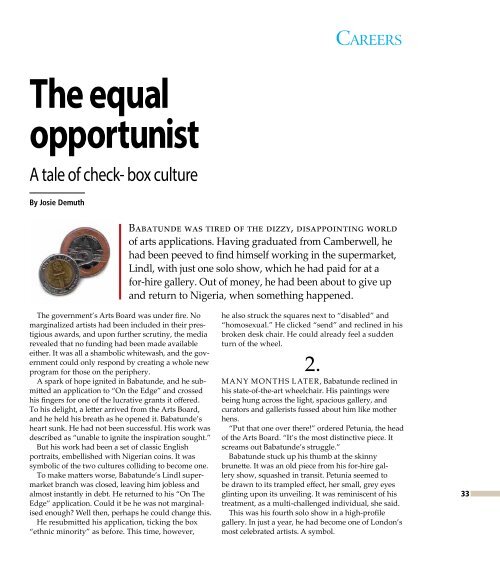artenol0416_sm_flipbook
Create successful ePaper yourself
Turn your PDF publications into a flip-book with our unique Google optimized e-Paper software.
Careers<br />
The equal<br />
opportunist<br />
A tale of check- box culture<br />
By Josie Demuth<br />
Babatunde was tired of the dizzy, disappointing world<br />
of arts applications. Having graduated from Camberwell, he<br />
had been peeved to find himself working in the supermarket,<br />
Lindl, with just one solo show, which he had paid for at a<br />
for-hire gallery. Out of money, he had been about to give up<br />
and return to Nigeria, when something happened.<br />
The government’s Arts Board was under fire. No<br />
marginalized artists had been included in their prestigious<br />
awards, and upon further scrutiny, the media<br />
revealed that no funding had been made available<br />
either. It was all a shambolic whitewash, and the government<br />
could only respond by creating a whole new<br />
program for those on the periphery.<br />
A spark of hope ignited in Babatunde, and he submitted<br />
an application to “On the Edge” and crossed<br />
his fingers for one of the lucrative grants it offered.<br />
To his delight, a letter arrived from the Arts Board,<br />
and he held his breath as he opened it. Babatunde’s<br />
heart sunk. He had not been successful. His work was<br />
described as “unable to ignite the inspiration sought.”<br />
But his work had been a set of classic English<br />
portraits, embellished with Nigerian coins. It was<br />
symbolic of the two cultures colliding to become one.<br />
To make matters worse, Babatunde’s Lindl supermarket<br />
branch was closed, leaving him jobless and<br />
almost instantly in debt. He returned to his “On The<br />
Edge” application. Could it be he was not marginalised<br />
enough? Well then, perhaps he could change this.<br />
He resubmitted his application, ticking the box<br />
“ethnic minority” as before. This time, however,<br />
he also struck the squares next to “disabled” and<br />
“homosexual.” He clicked “send” and reclined in his<br />
broken desk chair. He could already feel a sudden<br />
turn of the wheel.<br />
2.<br />
MANY MONTHS LATER, Babatunde reclined in<br />
his state-of-the-art wheelchair. His paintings were<br />
being hung across the light, spacious gallery, and<br />
curators and gallerists fussed about him like mother<br />
hens.<br />
“Put that one over there!” ordered Petunia, the head<br />
of the Arts Board. “It’s the most distinctive piece. It<br />
screams out Babatunde’s struggle.”<br />
Babatunde stuck up his thumb at the skinny<br />
brunette. It was an old piece from his for-hire gallery<br />
show, squashed in transit. Petunia seemed to<br />
be drawn to its trampled effect, her <strong>sm</strong>all, grey eyes<br />
glinting upon its unveiling. It was reminiscent of his<br />
treatment, as a multi-challenged individual, she said.<br />
This was his fourth solo show in a high-profile<br />
gallery. In just a year, he had become one of London’s<br />
most celebrated artists. A symbol.<br />
33

















